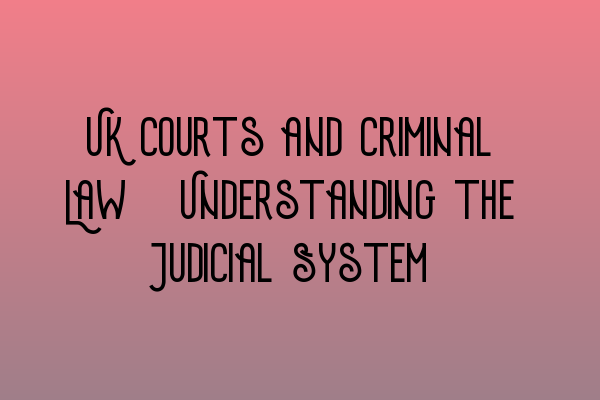UK Courts and Criminal Law: Understanding the Judicial System
Welcome to SQE Criminal Law & Practice Law UK, your trusted source for legal information. In this blog post, we will delve into the intricate workings of the UK courts and criminal law system. Whether you’re studying for the SQE exams or simply interested in expanding your knowledge, this guide will provide you with a comprehensive understanding of the judicial system.
The UK Courts: A Hierarchical Structure
The UK courts system follows a hierarchical structure, involving several levels of courts. Each level has its own jurisdiction and deals with specific types of legal matters. Understanding this structure is essential for anyone involved in criminal law.
The structure starts with the Magistrates’ Courts, which primarily handle less serious offenses such as minor assaults, traffic offenses, and initial hearings for more serious crimes. For a detailed understanding of the proceedings in Magistrates’ Courts, check out our SQE 1 Practice Mocks FLK1 FLK2 article.
More serious offenses are heard in the Crown Court, which deals with indictable offenses and criminal trials. It has greater sentencing powers and, unlike Magistrates’ Courts, can conduct jury trials. For preparation courses related to the Crown Court processes, refer to our SQE 1 Preparation Courses.
The Criminal Law System: Key Principles and Processes
Understanding the key principles and processes of criminal law is crucial when working within the judicial system. This includes knowing the elements of various offenses, the burden of proof, and the importance of legal representation.
There are several common offenses in criminal law such as theft, assault, and drug offenses. Each offense has specific elements that must be proven beyond a reasonable doubt. To brush up on the elements of criminal offenses, take a look at our SQE 1 Practice Exam Questions.
The burden of proof lies with the prosecution in criminal cases. The prosecution must present evidence that establishes the guilt of the defendant. If you want to improve your knowledge of the burden of proof and its implications, our SQE 2 Preparation Courses are designed to help you with that.
Legal representation is a fundamental right in criminal proceedings. Adequate legal representation ensures a fair trial for defendants. If you want to explore more about the importance of legal representation, visit our SQE 2 Preparation Courses article.
Stay Updated with SRA SQE Exam Dates
For aspiring legal professionals, it’s essential to stay up to date with the SRA SQE exam dates. The SQE exams are designed to assess the competence of prospective solicitors. Familiarize yourself with the exam dates and schedule your preparation accordingly by referring to our SRA SQE Exam Dates article.
By gaining a thorough understanding of the UK courts and criminal law system, you will be better equipped for success in your SQE exams and future legal career. Remember to utilize our practice exams, mocks, and preparation courses for comprehensive learning and preparation.
Thank you for joining us at SQE Criminal Law & Practice Law UK. For more insightful articles and resources, don’t hesitate to explore our website further.
